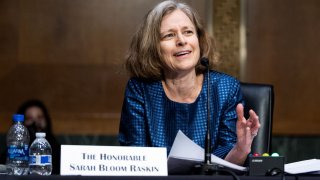
- Senate Republicans suggested Sarah Bloom Raskin used her status as a former government official to help a company whose board she sat on get special access to the Fed's payments system.
- Raskin is President Joe Biden's nominee for the top bank supervisory post at the Federal Reserve.
- Raskin repeatedly refused to answer questions from Wyoming Sen. Cynthia Lummis about whether she called the Federal Reserve on behalf of that company, Reserve Trust, after joining its board.
- A Senate Republican aide told CNBC that Sen. Pat Toomey, R-Pa., sent a letter to the Kansas City Fed in early February requesting information about Raskin's purported calls to the Fed bank in 2017.
Senate Republicans suggested Thursday that Sarah Bloom Raskin — President Joe Biden's nominee for the top bank supervisory post at the Federal Reserve — used her status as a former government official in 2017 to help a company whose board she sat on get special access to the Fed's payments system.
Raskin repeatedly refused to answer questions from Wyoming Republican Cynthia Lummis about whether she called the Kansas City Regional Federal Reserve on behalf of that company, Reserve Trust, after joining its board. Lummis said Raskin, who spoke before the Senate Banking Committee, did make such a call.
A Senate Republican aide later told CNBC that Sen. Pat Toomey, a Pennsylvania Republican and the ranking member of the committee, sent a letter to the Kansas City Fed in early February requesting information about Raskin's purported calls to the regional Fed bank in 2017.
Get DFW local news, weather forecasts and entertainment stories to your inbox. Sign up for NBC DFW newsletters.
The aide added that a Fed official replied to Toomey and confirmed that Raskin did indeed place a phone call to the Kansas City Fed on behalf of Reserve Trust's master account application.
A representative for the Kansas City Fed declined to comment when contacted by CNBC.
A White House spokesperson said, "Sarah Bloom Raskin has always taken her ethical obligations very seriously during and after her public service."
Money Report
"As part of her nomination, she worked with career officials at the Federal Reserve and the Office of Government Ethics to comply with all ethics requirements — just as she did the previous two times she was confirmed by the Senate," the White House said.
"Senator Lummis engaged [in] innuendo with no facts presented to back up her false claims. If Senator Lummis had any information to back up her innuendo she would have presented it at the hearing," the spokesperson said.
Lummis did not suggest that Raskin broke the law, but rather that the former Fed governor and Treasury deputy used her clout from her prior stints in government as an advantage in the corporate sector. That practice is sometimes referred to as a "revolving door" between politics and corporate interests.
"It doesn't mean that Bloom Raskin violated the law," said Kathleen Clark, a law professor at Washington University in St. Louis. But, "on the part of the public, this raises a question about the 'revolving door,' about whether revolving-door legal restrictions are strict enough."
"Lummis is obviously is raising the question of whether a competitor financial institution is disadvantaged because they didn't have access, because they didn't have Bloom Raskin on their board," Clark added.
Raskin served four years as a Federal Reserve governor and then as a deputy secretary at the Treasury Department before joining the board of Reserve Trust, a financial technology payments company, in May 2017.
A month later, Reserve Trust's first application for a Federal Reserve master account was denied.
Fintech firms like Reserve Trust have long sought Fed master accounts, which allow companies direct access to the Fed's payment systems, and to settle transactions with other participants through the central bank.
The vast majority of nonbank fintechs, which include Reserve Trust, must partner with banks insured by the FDIC to indirectly access the Fed's payment services.
"Reserve Trust is a Special Purpose Depository Institution (SPDI) that, like many other FinTech companies wants access to the Federal Reserve's payment system to be able to conduct financial transactions (like a bank) but without all the red tape regulations that larger banks are held to," San Diego-based tax attorney John Milikowsky wrote Thursday afternoon.
Reserve Trust did not immediately respond to a voice message seeking comment.
Lummis grills Raskin
Lummis said Thursday that Raskin called the Kansas City Regional Federal Bank in August 2017 about the denial of Reserve Trust's master account application two months earlier.
Reserve Trust ultimately was granted a Fed master account in 2018, Lummis said.
"To my knowledge, there's one, and only one, state-chartered trust company that has a Fed master account," Lummis said at Raskin's confirmation hearing.
"It's a start-up based in Colorado formed in 2016, called Reserve Trust," Lummis noted.
"Reserve Trust has repeatedly touted the value of the company's Fed master account," the senator said.
"Their homepage says in 2021, one of the company's investors underscored that Reserve Trust is armed with a master account at the Federal Reserve and direct access to the payment rails, the only fintech company in the country [that has such an account]."
Lummis then said, "It's a mystery to me how dozens of fintech companies have tried unsuccessfully, and how Wyoming's SPDI charter has been under review for well over a year — two and a half years at the Fed consulting with them about how to make this qualify."
"How did Reserve Trust get there so quickly?" Lummis asked Raskin. "After Reserve Trust had their application denied, did you communicate with the Federal Reserve about Reserve Trust's application?"
Raskin responded by saying she was on that company's board of directors from 2017 through 2019.
Lummis shot back: "And they got their master account in 2018. So, did you call or communicate with the Federal Reserve about Reserve Trust's application?"
Raskin again refused to answer that question.
"Well, certainly, if you are suggesting anything improper, I want to make very clear that I have, first of all, had the honor to serve in various public capacities," Raskin said. "And each time I've left I have been very mindful of the rules regarding departure."
Lummis pressed the question a third time, saying that she understood that Raskin did call the Kansas City Fed in August 2017.
"So Reserve Trust is denied, you go on their board, then they get a master account. Did you communicate with the Board of Governors about Reserve Trust's application?" Lummis asked.
"So I can assure you that I have been very focused," Raskin replied before Lummis cut in, asking: "Well, who did you who did you communicate with?"
Raskin then said, "First of all, I want to be very clear here. The Federal Reserve has approved plenty of master accounts."
Lummis said, "But not in fintech."
In her questioning of Raskin, Lummis noted that Amias Gerety, a former acting assistant secretary at the Treasury Department, held that position while Raskin was deputy secretary at Treasury. Gerety is also a partner at QED Investors, which is currently the controlling owner of Reserve Trust, Lummis said.
"So in 2020, QED Investors purchased the 195,000 Reserve Trust shares you received when you joined the board in 2017," Lummis told Raskin. "And they purchased your shares for almost $1.5 million. Even in this town, that's a lot of money for being on a company's board of directors for two years."
The senator then said: So let me recap: "You leave Treasury, you serve on the board of Reserve Trust for two years. Their first application for a master account is denied. But after the denial, you call the Federal Reserve and Reserve Trust receives a Fed master account, the only state-chartered trust company in the country to get one. And you walk away with a million and a half dollars."
Lummis added: "Something doesn't smell right with the way this played out. My state's companies, my constituents have been stonewalled, have been slow-walked and have not been able to get approval even though they've been working with the Fed for two and a half years on our very specific guidelines for getting master accounts."
— CNBC's Michael Bloom contributed reporting.






